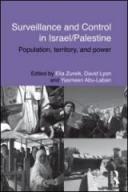IRSP IV: Surveillance and Population Management
(Team Leaders: David Lyon and Elia Zureik, Queen's University)
The focus of this IRSP is to link state surveillance activities to population management in conflict zones. Population management involves studying how populations are identified, sorted, categorized, and spatially located. This IRSP focuses on Israel/Palestine as an exemplary conflict zone that also has a major impact on surveillance practices elsewhere. The Israeli case is central for several reasons: Institutional aspects of surveillance are most developed in Israel and are basic to current forms of governance in the region, as are key surveillance production and marketing sites (surveillance technologies have been predominant spin-offs of Israel’s military and security industries since 9/11). Research investigates surveillance-related aspects of identity, population management, citizenship status and ways to monitor it, mobility of people (in particular the role of the check points, the wall, curfews, closures, etc.), use of military technology in civilian areas, and urban designs and land usage. At the same time, the recipients of surveillance technologies and techniques developed in Israel will also be examined, particularly in select European and North American countries. The theme of securitization, conflict zones and surveillance will be pursued throughout the project, but the first two years will lay the foundations for this research with a view to expand it to include other regions dominated by conflict.
The research workshop States of Exception, Surveillance and Population Management: The Case of Israel/Palestine is an outcome of IRSP IV.
Surveillance and Control in Israel/Palestine
Edited by Elia Zureik, David Lyon, and Yasmeen Abu-Laban
Routledge, 2010
Surveillance is always a means to an end, whether that end is influence, management or entitlement. This book examines the several layers of surveillance that control the Palestinian population in Israel and the Occupied Territories, showing how they operate, how well they work, how they are augmented, and how in the end their chief purpose is population control. Showing how what might be regarded as exceptional elsewhere is here regarded as the norm, the book looks not only at the political economy of surveillance and its technological and military dimensions, but also at the ordinary ways that Palestinians in Israel and the occupied territories are affected in their everyday lives.
Canadian and Israeli Defense -- Industrial and Homeland Security Ties: An Analysis
by Kole Kilibarda, November 2008, The New Transparency Project, Working Paper II, IRSP IV.
The Political Economy of Israel’s Homeland Security
by Neve Gordon, April 2009, The New Transparency Project, Working Paper III, IRSP IV.
Surveillance Policies, Practices and Technologies in Israel and the Occupied Palestinian Territories: Assessing the Security State
by Andrew Stevens, November 2011, The New Transparency Project, Working Paper IV, IRSP IV.
The Role of Social Sorting and Categorization Under Exceptionalism in Controlling a National Minority: The Palestinians in Israel
by Ahmad H. Sa'di, November 2011, The New Transparency Project, Working Paper V, IRSP IV.